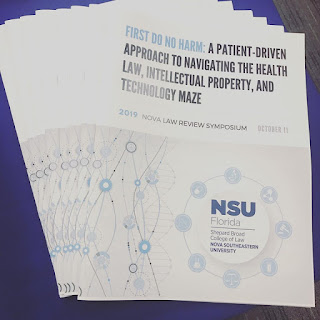2019 Symposium - The Cutting Edge of Tech & Health Law
On Friday, October 11, 2019 contemporary academics, professionals, practitioners and students met on the third floor of the Panza Maurer Law Library for a day of lively discussion on the intersection between health law, intellectual property, and technology. Each year, the Nova Law Review hosts a series of panels on cutting edge topics and 2019 was as exceptional, featuring diverse speakers from all over the country.
First Do No Harm: A Patient-Driven Approach to Navigating the Health Law, Intellectual Property, and Technology Maze
During the first session, presenters discussed the nuances surrounding many health related topics such as the possibility of a Medical Data Information Commons. Marielle S. Gross, MD, MBE started the conversation, with a simple, but provocative question: “What is health data?” From the perspective of a medical practitioner, Dr. Gross shared her perspectives on de-identified data and how aggregates can be used to help solve a single patient medical mysteries.
Melissa M. Goldstein, J.D. built on those concepts by expanding on the policies surrounding the meaning and application of “Sensitive” Health Information, how the definition has changed over the years.
To complete the panel, Sharon Bassan, Ph.D., challenged the idea of a patient control over their own genetic data. She deftly illustrated the flaws in that idea by offering as an example the prevalent direct to consumer genetic testing companies and the density of their mandatory privacy policies tied to obtaining their services.
The second panel entitled "Patient Protection or Caveat Emptor? (Some) Risks Posed By High-Tech, Data-Driven Medicine" featured a composite of professionals who talked about the practical applications of law in the healthcare market. Jennifer Wagner, J.D., Ph.D. broke down the Federal Trade Commission’s ("FTC") involvement with policing marketing deception and the intersection with health products and services. Have you used eye training or blood pressure apps? If their claims to cure or improve certain symptoms are unsubstantiated they may fall under the FTC's jurisdiction.
Professor Bethany Corbin, J.D., LL.M., introduced the attendees to FEMTECH and the challenges facing innovators, designers, and consumers in the largely new and untapped industry of female healthcare software ad mobile applications.
To demonstrate the difference between the manufacture of a regular drug and a biologic, Yaniv Heled, J.S.D., LL.M., LL.B. compared it to the difference between making a skateboard and building a Tesla Model X. A red one. He explained the difficulty of expanding the biological pharmaceutical market which has a high-cost barrier to entry and steep intellectual property implications.
After lunch, we dove into the cutting edge topic of gene-editing, wondering if it will improve health, promote eugenics, or both. Myrisha Lewis, J.D. got us thinking about the parallels and inter-connectivity between gene-editing and assisted reproduction and how similar regulatory structures may apply, namely to allow state rather than federal jurisdiction monitor the steadily growing field.
Seema Mohapatra complimented the discussion with thoughts on the regulation of human germline editing and analyzed the impact on creating a modern era of eugenics, noting that public desire and preferences drove the science in the past.
Samantha Zyontz condensed her years of study into a compelling segment on how CRISPR gene-editing technology is actually being used and shared among the research community. Jonas Monast rounded out the discussion on gene-editing by shifting the focus to the ecosystem, natural resources, and animal life on the planet—from the hope of eliminating malaria to the wonder of bringing back extinct species!
Danna Khawam, Editor-in-Chief of the Nova Law Review, was instrumental in the success of the symposium. There was a significant investment of time, effort, and organization involved in facilitating the exchange of ideas in the heathcare-technology field. The journal’s forthcoming Symposium book will be published in Spring 2020 with various articles about the topics discussed at the event.
On behalf of the Nova Law Review, we would like to thank everyone who helped make this event possible. First, we would like to recognize Dean Jon Garon, Dean Debra Moss Vollweiler, Professor Kathy Cerminara, Professor Marilyn Uzdavines, and the journal's advisers, Professor Ishaq Kundawala and Dean Elena Marty-Nelson.
We would also like to specially thank the moderators, Robert Kain and Professor Cerminara for offering their time for the panels. We appreciate Karen Rose, Kathleen Perez, Johanna Desir, and the rest of administration for the countless hours they spent preparing for to make the event a success.
Lastly, we are thankful for the support and help of Nova Law Review’s Executive Board, Robert Scheppske (Goodwin Alumni Editor), Nicolo Lozano (Assistant Executive Editor), and all the members of Volume 44.




